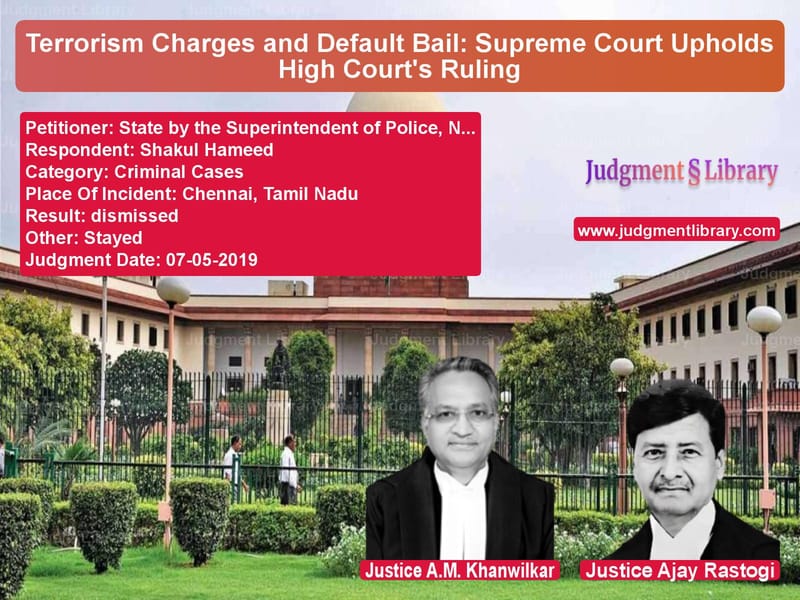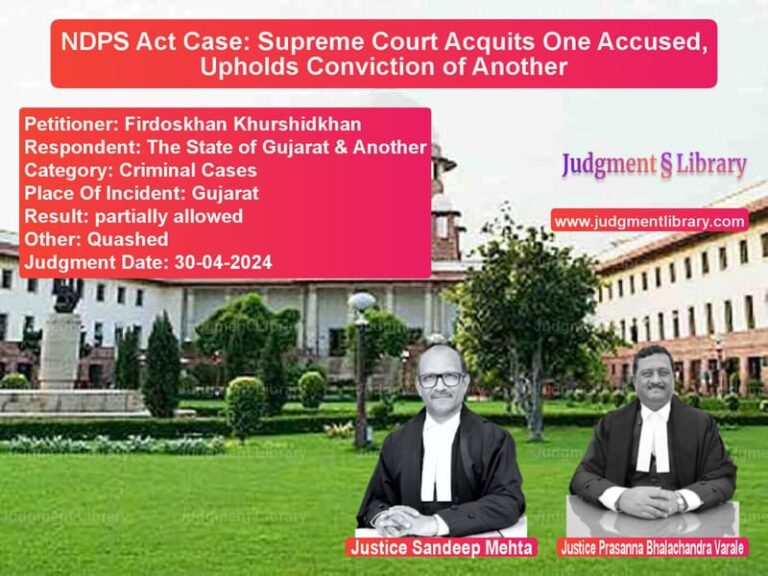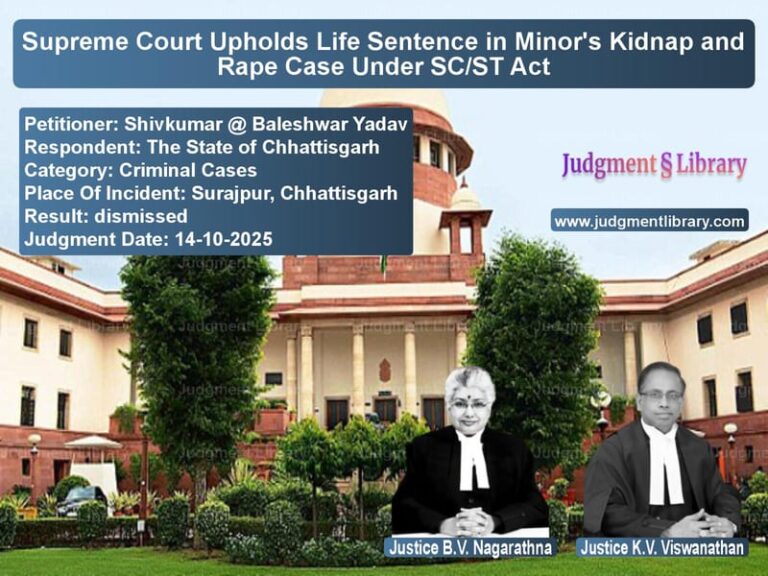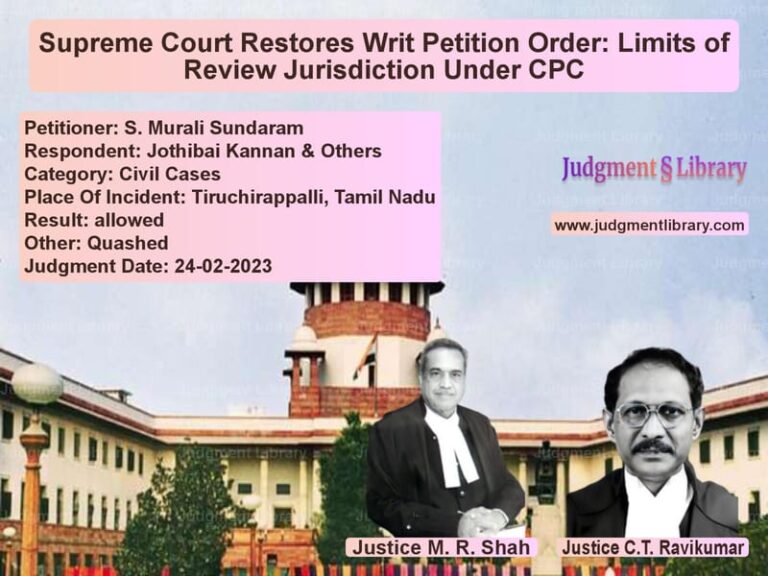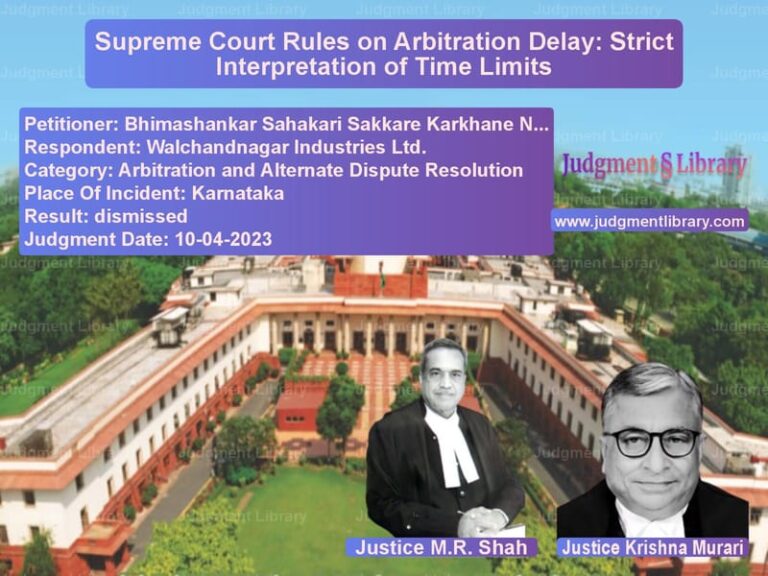Terrorism Charges and Default Bail: Supreme Court Upholds High Court’s Ruling
The Supreme Court of India, in the case of State by the Superintendent of Police, National Investigation Agency, Kochi vs. Shakul Hameed, addressed an appeal challenging the grant of default bail to an accused charged under the Unlawful Activities (Prevention) Act, 1967 (UAPA). The Supreme Court ultimately declined to interfere with the High Court’s decision, though it clarified that the extension of the accused’s detention was legally justified.
The case is significant as it deals with the interpretation of Section 43D(2)(b) of UAPA concerning the extension of detention beyond 90 days and the conditions under which default bail can be granted.
Background of the Case
The prosecution alleged that nine individuals, including the accused respondent Shakul Hameed, were involved in a criminal conspiracy to join the terrorist organization ISIS (Daesh). According to the National Investigation Agency (NIA), the accused were radicalized and had planned to travel to Syria to join ISIS. The case was registered under R.C. No. 03/2017/NIA/DLI on January 26, 2017, invoking sections 120B of IPC and multiple provisions of UAPA.
Shakul Hameed was arrested on September 18, 2017. The special investigation team sought an extension of his detention beyond 90 days, citing the need for further investigation. The Special Court granted this extension on December 12, 2017. However, the Madras High Court later set aside this extension and granted default bail to the accused, leading to the present appeal before the Supreme Court.
Legal Issues in the Case
The Supreme Court examined the following key issues:
- Whether the extension of detention under Section 43D(2)(b) of UAPA was justified.
- Whether the High Court erred in granting default bail.
- Whether default bail granted due to procedural lapses could be overturned.
Arguments by the Appellant (NIA)
The NIA, represented by the Special Public Prosecutor, argued:
- The extension of detention was legally justified under Section 43D(2)(b) of UAPA.
- The Special Public Prosecutor had provided specific reasons in the application for extending the detention beyond 90 days.
- The High Court failed to appreciate the necessity of continued custody for national security reasons.
- The accused was a radicalized individual who had attempted to travel to Syria and needed further interrogation.
Arguments by the Respondent (Shakul Hameed)
The defense countered:
- The reasons provided by the Special Public Prosecutor were insufficient to justify continued detention.
- The Madras High Court rightly set aside the extension order for non-compliance with legal requirements.
- Once default bail is granted, it cannot be reversed, as per established precedents.
- Other co-accused had already been granted bail, and Shakul Hameed was similarly placed.
Supreme Court’s Key Observations
The Supreme Court reviewed the case records and made the following observations:
1. The Special Court’s Extension Order Was Legally Justified
- The Court found that the extension of detention under Section 43D(2)(b) of UAPA was legally correct.
- The reasons given by the Special Public Prosecutor were valid and met the statutory requirements.
- “The satisfaction recorded by the Special Court on the specific reasons assigned by the Public Prosecutor could not have been overturned unless very strong reasons were forthcoming.”
2. The Grant of Default Bail Was Procedurally Correct
- The High Court granted default bail based on its finding that the Special Public Prosecutor’s reasons did not meet the threshold of Section 43D(2)(b).
- The Supreme Court disagreed with the High Court’s reasoning but noted that since bail had already been granted, reversing it would not be appropriate.
3. The Rights of the Accused Had Changed
- The Court emphasized that once an accused is granted bail and released, their legal status changes.
- “The accused had not violated any bail conditions, and therefore, it would not be appropriate to interfere with the High Court’s decision.”
4. The Prosecution Can Apply for Bail Cancellation If Needed
- The Court clarified that the prosecution retains the right to apply for bail cancellation in the future if new evidence emerges.
- The Special Court was directed to expedite the trial and conclude it by March 2020.
Final Judgment
The Supreme Court ruled:
- While the extension of detention was justified, the High Court’s decision granting default bail would not be interfered with.
- The NIA could move for bail cancellation if required.
- The trial must be expedited to ensure swift justice.
Implications of the Judgment
This ruling has important implications for counterterrorism investigations and procedural fairness:
1. Clarification on Default Bail Under UAPA
- The ruling clarifies that procedural lapses in detention extension can lead to default bail.
- Courts will closely scrutinize requests for extending custody beyond 90 days.
2. Protection of Accused’s Rights
- The ruling reaffirms that once default bail is granted, it cannot be easily overturned.
- Accused persons who comply with bail conditions will not be re-arrested without strong grounds.
3. Balancing National Security and Legal Fairness
- The ruling ensures that anti-terror laws are applied fairly without violating the accused’s rights.
- Law enforcement agencies must provide compelling reasons to justify extended detention.
Conclusion
The Supreme Court’s ruling in State by the Superintendent of Police, NIA, Kochi vs. Shakul Hameed is a landmark judgment balancing national security concerns with procedural fairness. While upholding the legal basis for detention extension under UAPA, the Court declined to interfere with default bail already granted. This decision strengthens due process protections while allowing law enforcement agencies to pursue legal remedies if needed.
Petitioner Name: State by the Superintendent of Police, National Investigation Agency, Kochi.Respondent Name: Shakul Hameed.Judgment By: Justice A.M. Khanwilkar, Justice Ajay Rastogi.Place Of Incident: Chennai, Tamil Nadu.Judgment Date: 07-05-2019.
Don’t miss out on the full details! Download the complete judgment in PDF format below and gain valuable insights instantly!
Download Judgment: State by the Superin vs Shakul Hameed Supreme Court of India Judgment Dated 07-05-2019.pdf
Direct Downlaod Judgment: Direct downlaod this Judgment
See all petitions in Terrorist Activities
See all petitions in Bail and Anticipatory Bail
See all petitions in Extortion and Blackmail
See all petitions in Judgment by A M Khanwilkar
See all petitions in Judgment by Ajay Rastogi
See all petitions in dismissed
See all petitions in Stayed
See all petitions in supreme court of India judgments May 2019
See all petitions in 2019 judgments
See all posts in Criminal Cases Category
See all allowed petitions in Criminal Cases Category
See all Dismissed petitions in Criminal Cases Category
See all partially allowed petitions in Criminal Cases Category

